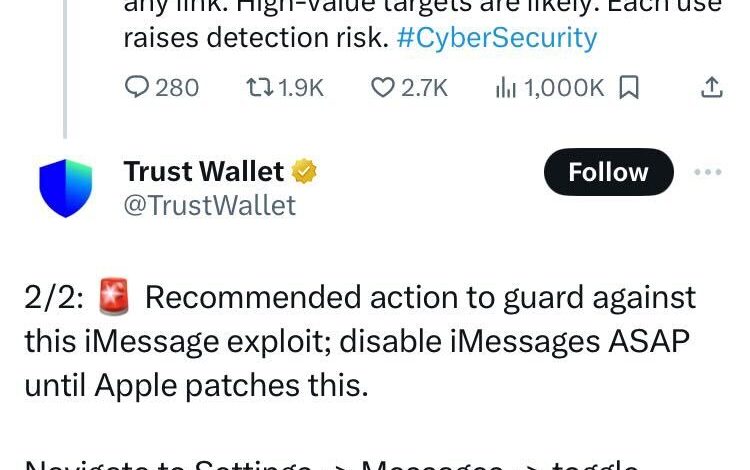iMessage Zero-Day Exploit: What Apple Users Need to Know

Trust Wallet, a cryptocurrency wallet service, is recomme
nding Apple customers disable iMessage, citing “credible intel” about a zero-day issue that might allow hackers to take control of their phones.
“Alert for iOS users: We have credible intel regarding a high-risk zero-day exploit targeting iMessage on the Dark Web,” the business said on X. The firm emphasized that the zero-day attack can penetrate and take control of iPhone users without requiring them to open a link and that high-value account holders are particularly vulnerable.
Alleged iMessage Zero-Day Threat Sparks Controversy
A zero-day exploit is a cyberattack vector that makes use of an undiscovered or unpatched security hole in computer software, hardware, or firmware. Trust Wallet stated that any cryptocurrency wallets stored on an iPhone with iMessage enabled are in danger. Eowyn Chen, the firm’s CEO, shared a screenshot of what she believes is a potential zero-day exploit with an asking price of $2 million.
Trust Wallet recently issued a warning about a potential zero-day exploit targeting iMessage on iOS devices. However, several industry experts have dismissed the threat, calling it unsubstantiated. Pseudonymous blockchain analyst Beau pointed out the lack of evidence for an iOS hack, emphasizing that Trust Wallet’s alert could cause unnecessary panic.
Despite this skepticism, Trust Wallet’s notice garnered significant attention, with over 1.2 million users viewing it within the first four hours. The company clarified that their information came from their security team and partners, who are actively monitoring risks. Meanwhile, Apple has released emergency security fixes to address two iOS zero-day vulnerabilities used in recent iPhone attacks. Kaspersky security researchers note that hackers have previously exploited Apple’s iMessage as an attack vector.
Additionally, cybersecurity firm Halborn warned that over 280 blockchain networks are vulnerable to zero-day attacks, potentially putting over $25 billion in cryptocurrency at risk.